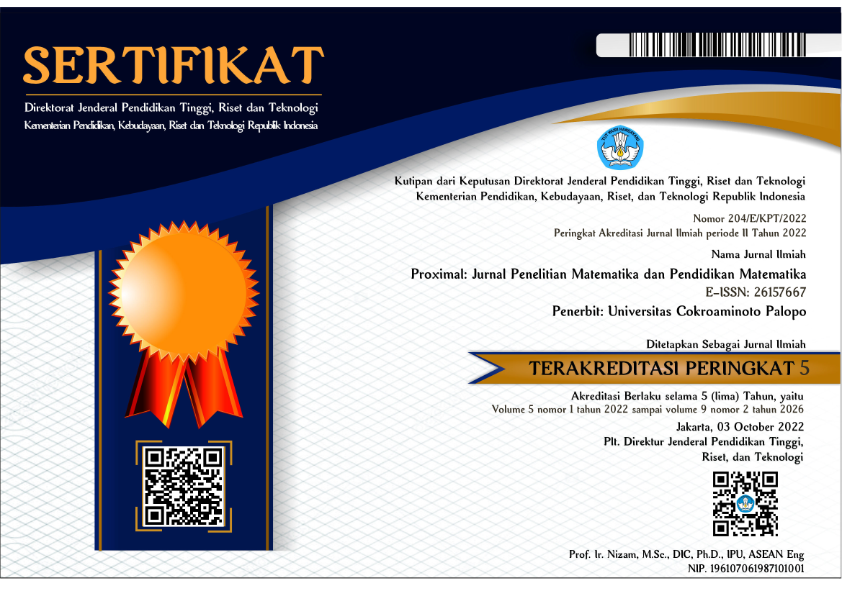Analisis Kemampuan Literasi Matematika Siswa dalam Menyelesaikan Soal PISA Ditinjau dari Gender
DOI:
https://doi.org/10.30605/proximal.v7i1.3443Keywords:
Literasi Matematika, PISA, GenderAbstract
Penelitian ini bertujuan untuk mengetahui kemampuan literasi matematika siswa dalam menyelesaikan soal PISA ditinjau dari gender. Jenis penelitian ini adalah metode penelitian kualitatif deskriptif dengan pemberian tes kemampuan literasi matematika yang diadaptasi dari soal PISA dan pedoman wawancara. Subjek penelitian terdiri dari 2 siswa yakni 1 siswa berjenis kelamin laki-laki dan 1 siswa berjenis kelamin perempuan. Adapun hasil dari penelitian siswa laki-laki mampu mencapai empat kompetensi literasi matematika, dan siswa perempuan mampu mencapai tiga kompetensi literasi matematika dari enam kompetensi literasi matematika yang digunakan yaitu matematisasi, menggunakan bahasa dan operasi simbolik yang formal dan teknis, komunikasi, penalaran dan argumen, merancang strategi untuk memecahkan masalah dan representasi.
Downloads
References
Abidin, Z., Kadir, & Arapu, L. (2020). Analisis Kesalahan Siswa Kelas IX SMP 2 Kendari dalam Menyelesaikan Soal Literasi Matematis. Jurnal Amal Pendidikan, 52-62. DOI: https://doi.org/10.36709/japend.v1i1.11435
Asrama dkk. (2017). Analisis Kesulitan Siswa Dalam Menyelesaikan Soal Cerita Matematika Topik Pecahan Ditinjau Dari Gender. JTAM | Jurnal Teori Dan Aplikasi Matematika, 2(2), 118–122. https://doi.org/10.31764/jtam.v2i2.713 DOI: https://doi.org/10.31764/jtam.v2i2.713
Creswel, J. W. (2015). Penelitian Kualitatif dan Desain Riset Memilih diantara Lima Pendekatan (Edisi 3). Yogyakarta: Pustaka Pelajar.
Creswell, J. (2016). Research Design Pendekatan Metode Kualitatif, Kuantitatif, dan Campuran (Edisi Empa). Yogyakarta: Pustaka Pelajar.
Fathani, A. H. (2016). Pengembangan Literasi Matematika Sekolah dalam Perspektif Multiple Intelligences. Jurnal Pendidikan Sains dan Matematika, 136-150.
Janah, S. R., Suyitno, H., & Isnaini, R. (2019). Pentingnya Literasi Matematika dan Berpikir Kritis Matematis dalam Menghadapi abad ke-21. Prosiding Seminar Nasional Matematik, 905-910.
Jumarniati, J., Pasandaran, R. F., & Riady, A. (2016). Kemampuan Literasi Matematika dalam Menyelesaikan Masalah Turunan Fungsi Trigonometri. Pedagogy: Jurnal Pendidikan Matematika, 1(2).
Karmila, K. (2018). Deskripsi Kemampuan Literasi Matematika Siswa Ditinjau Dari Gender. Pedagogy: Jurnal Pendidikan Matematika, 126-155.
OECD. 2019. Programme for International Student Assesment.
Pratiwi, I. (2019). Efek Program PISA terhadap Kurikulum di Indonesia. Jurnal Pendidikan dan Kebudayaan, 51-71. DOI: https://doi.org/10.24832/jpnk.v4i1.1157
Safitri, N. I. (2016). Analisis Kemampuan Literasi Matematis Siswa Dalam Perspektif Gender (Doctoral dissertation, UIN Sunan Ampel Surabaya). http://digilib.uinsby.ac.id/4842/7/Cover.pdf. Diakses 02 Juni 2022.
Downloads
Published
How to Cite
Issue
Section
License
In submitting the manuscript to the journal, the authors certify that:
- They are authorized by their co-authors to enter into these arrangements.
- The work described has not been formally published before, except in the form of an abstract or as part of a published lecture, review, thesis, or overlay journal.
- That it is not under consideration for publication elsewhere,
- That its publication has been approved by all the author(s) and by the responsible authorities – tacitly or explicitly – of the institutes where the work has been carried out.
- They secure the right to reproduce any material that has already been published or copyrighted elsewhere.
- They agree to the following license and copyright agreement.
License and Copyright Agreement
Authors who publish with this journal agree to the following terms:
- Authors retain copyright and grant the journal right of first publication with the work simultaneously licensed under Creative Commons Attribution License (CC BY 4.0) that allows others to share the work with an acknowledgment of the work's authorship and initial publication in this journal.
- Authors are able to enter into separate, additional contractual arrangements for the non-exclusive distribution of the journal's published version of the work (e.g., post it to an institutional repository or publish it in a book), with an acknowledgment of its initial publication in this journal.
- Authors are permitted and encouraged to post their work online (e.g., in institutional repositories or on their website) prior to and during the submission process, as it can lead to productive exchanges, as well as earlier and greater citation of published work.















